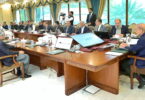F.P. Report
KARACHI: The newly announced $200 million support by the United Arab Emirates for Pakistan’s SMEs will help create jobs and enhance exports, Pakistan’s de facto finance minister, Dr. Abdul Hafeez Shaikh said on Thursday.
Sheikh Mohamed bin Zayed Al Nahyan, Crown Prince of Abu Dhabi and Deputy Supreme Commander of the UAE Armed Forces, on Thursday, directed the Khalifa Fund for Enterprise Development, Khalifa Fund, to allocate $200 million to support small and medium-sized enterprises, SMEs, in Pakistan.
The allocation comes after Al Nahyan’s meeting with Prime Minister Imran Khan in Islamabad during his daylong visit.
“Would like to thank HRH Sheikh Muhammed Bin Zayed Al-Nahyan, Crown Prince of Abu Dhabi and Deputy Supreme Commander of the Armed Forces for announcing $200 Million support to Pakistan after meeting with Prime Minister Imran Khan,” Shaikh tweeted.
He said that “the money will be spent on small business promotion and jobs,” adding that the support was a “testimony to the expanding economic relations and friendship between our countries.”
This initiative aims to encourage innovation in projects and support entrepreneurship, to assist the Pakistani government’s efforts to create a stable and balanced national economy that will help achieve the country’s sustainable development, UAE’s state news agency reported.
The initiative is also part of the close ties between the UAE and Pakistan and the keenness of their leaderships to strengthen and develop them, reflecting the development witnessed by their overall relations over the past decades.
Small and medium-sized businesses constitute nearly 90 percent of all enterprises in Pakistan employing 80 percent of the non-agricultural labor force and contributing 40 percent to the country’s GDP, according to Small and Medium Enterprises Development Authority (SMEDA).
The stakeholders of the SME sector complain about the lack of quick access to finances through banks. However, analysts expect the funds allocated by the UAE would help the sector to enhance exports enabling them to capitalize on the opportunity created after the implementation of the second phase of the China-Pakistan Free Trade Agreement.
“Depends on the method of disbursement. Banks are generally reluctant to lend to SMEs because of lack of transparency, succession and management issues,” Samiullah Tariq, Director Research at Arif Habib Limited, told Arab News.
“If in some way, the government allocates this fund to banks and they are able to disburse it to SMEs in an efficient way at a discounted rate then it can help SMEs avail China Pakistan FTA and increase Pakistan’s exports,” said Tariq
Calling for a clear policy for the SME sector, the stakeholders say that despite a 90 percent payback ratio, SMEs still face problems, unlike large enterprises.
“The small traders and businessmen are required to submit collateral for loans despite the fact that this sector. In UAE and other parts of the world, they have realized that without SMEs a country cannot be run but in Pakistan, we are still unable to clearly define what SMEs are,” Ali Raza, chairman of Pakistan Association for Small and Medium Enterprises, told Arab News.
Raza called for a review of SME policy with clear vision and incentives for the sector as many countries, including Japan, are willing to contribute to the sector’s growth. “SME sector should be facilitated and introduced with latest technology and innovations,” Raza suggested.






